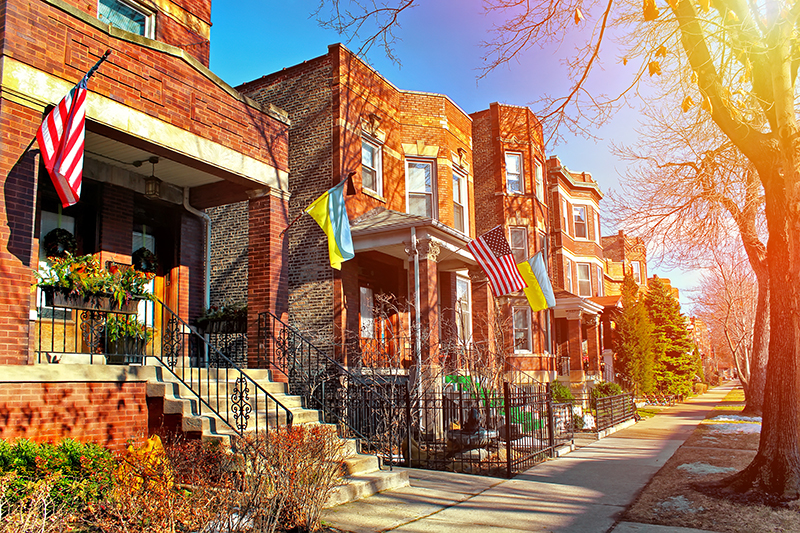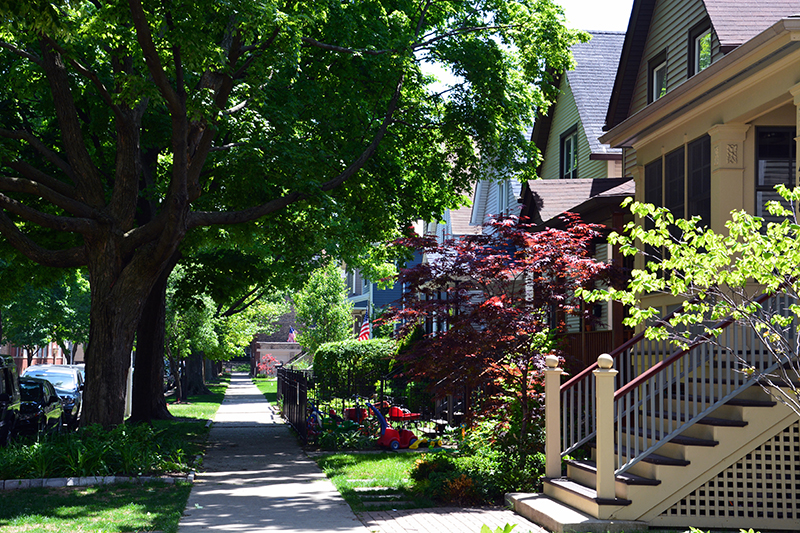
There is a low-key awesomeness to Chicago whether you are into architecture, music and art, street festivals or food and drink. The Windy City offers an ideal and idyllic place to put down roots or to strengthen the ties that bind generations of families to this historic city. A place that has much to offer in every lifestyle aspect that matters will, by necessity, have a dynamic real estate market regardless of what else is happening in the rest of the nation.
Why the City Endures
The City of Broad Shoulders knows how to maximize the advantages of being part of America’s heartland. It is the primary business and financial center in the Midwest. It is host to the corporate centers of at least 11 Fortune 500 companies with another 23 corporate headquarters located elsewhere in the area. Businesses thrive because of its central location but also because the transportation and infrastructure needed to support dynamic business systems are in place.1 The mass transport system of buses, elevated rail and subways move about 1.7 million passengers daily, making the city’s employment and business hubs accessible to city and suburban residents.
Additionally, businesses have access to an enviable talent pool, emerging from various academic and research institutions in the region. There are at least 22 colleges within the ‘The Loop,’ and another 49 post-secondary campuses within 40 miles of downtown. Some of the nation’s top schools for the pre-collegiate levels are located in the Windy City.
The Chicago lifestyle may be more laid-back than New York or Los Angeles, but it is right up there with bigger metro areas when it comes to choices for entertainment, leisure, and recreation. Aside from well-known cultural institutions, the city boasts of the following big numbers:
- About 200 theaters
- Another 200 art galleries for art enthusiasts
- 7,300 restaurants and counting for foodies
- 15 miles of beaches
- 19 miles of bike paths fronting Lake Michigan
- 552 parks
- Professional sports teams for football, baseball, ice hockey, basketball and soccer leagues
- Overview of Housing Trends
Data from the Illinois Association of Realtors indicate that home sales for March 2018 declined by 10.1 percent on a year-over-year basis. A comparison of the numbers over 11 years shows that average home sales for the given period was the second highest in the data set, but the 2018 numbers showed a drop because of the extraordinary numbers recorded for 2017. This is not an indication of market weakness, but an indication of the underlying strength of the real estate market.
Inventory for both attached and detached single-family homes in the area hover within the 3-month range, which is considered exceptionally tight by industry analysts. Although the numbers for pending home sales appear to be flat, if not trending down slightly, tight inventory of available homes for sale will play a major role in price trends as well as buyer/seller motivations to complete property transactions. The number of days it took for listed houses to go under contract falls within a narrow range, indicating market stability and some sluggishness that may prove helpful to an investor.
Investing in Residential Properties
We have established various reasons why single-family housing in this city should be part of your investment portfolio. This is a market that meets the most important considerations for real property investing, which are presence of well-developed infrastructure and socioeconomic metrics that favor long-term investment. The Bureau of Labor Statistics reports that employment has increased year-over-year since 2010 although the rate of growth is below the national rate. This is indicative of a strong economic base, which typically favors stability in the housing market.
Any investor would be curious to see how these factors affect the market on the micro level. Millennials have shown a preference for renting rather than buying, but this may be because the hot housing market in recent years has limited the opportunities for first-time buyers. Renting was a viable option especially for those who envisioned a more mobile lifestyle. However, many have realized that rents will continue to rise over the years while mortgage rates could be locked in and set at fixed levels. The market downturn experienced nationwide starting in 2008 saw property values drop, but they have recovered to pre-recession levels for most of the U.S. including in the Midwest metro areas.

Opportunities in Foreclosure Properties
It is not possible to time the market’s ebb and flow, but from all indications, this is a great time to invest in real estate in this city, particularly in the overlooked sector of foreclosure properties. At Auction.com, foreclosure listings for this area currently exceed 550 properties. Savvy investors should look at this as an opportunity to invest in the market with a wide selection of available properties and an active market with a significant upside potential.
Needless to say, whether you are buying foreclosures to fix and flip, to convert to rentals or for your personal use, you will enjoy other advantages of property ownership. These upsides include:
- tax write-offs for some mortgage expenses and losses
- equity build-up over many years of ownership
- potential income streams from rental properties
Popular Neighborhoods
The Windy City is a diverse community, which makes it more interesting to explore. As an investor, you want to buy in a neighborhood that welcomes you. Some investors may prefer larger detached homes, ranging from mid to high priced while others may be more familiar with the attached style of family homes. These are some of the popular neighborhoods:
West Town is located between Wicker Park and Humboldt Park, including postal zip codes 60612, 60622, 60642 and 60647. This is an area close to downtown with a crime rate lower than most of the city. Accessible to many amenities, the livability score for West Town is 77 out of 100.2
Logan Square was largely spared from the home buying frenzy in recent years although it is located in the shadows of the popular Wicker Park and Bucktown. For investors, Logan Square presents a significant profit potential especially if you can find foreclosure properties in the 60614, 60618, 60622, 60639 and 60647 zip codes.3
Jefferson Park located in the city’s northwest section presents significant upside potential. You can get more square footage for your housing budget yet be in an area that is known as one of the city’s transportation hubs. Zip codes include 60630 and 60646.4
Chicago is your kind of town if you are looking to invest in a place where you can live, work and play and truly enjoy the experience. It is a city with a long history of providing economic opportunities to those who believe in hard work, commitment and creativity. When you’re ready to claim your niche in this town, look through the listings on Auction.com to browse available investment opportunities.
Start searching Chicago properties
The information in this blog post is being provided for informational purposes only and not for the purpose of providing legal or real estate investment advice, and no liability is assumed by Auction.com, LLC. with respect to such information.
Sources:
1Chicago Things To Do, Events, Restaurants, Hotels & Vacation Planning
https://www.choosechicago.com/
2,3,4 What Are the Top Neighborhoods For Investing in Chicago Real Estate? | Mashvisor
https://www.mashvisor.com/blog/top-neighborhoods-investing-chicago-real-estate/

